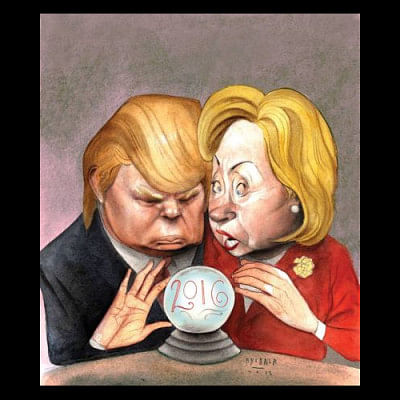Uneven contest, not a classy debate

Let's begin at the beginning: Lester Holt, thought to be a Republican by political belief (so what!) was appointed Moderator for Monday's first Hillary-Trump face-off at Hofstra University in New York by the National Commission for Presidential Debates. The NCPD, for short, is an independent, neutral and non-profit body tasked to organise the historic and democratically educative series of debates.
Even before laying out the format of the debate, the moderator spelled out a list of don'ts for the audience—'no clapping, no jeering or booing; nothing disruptive, just listening.' And ,the otherwise politically simmering audience complied with the instructions almost to the last person. I say 'almost' because of a muffled 'shame' of a whimper at the mention of the e-mail issue dying out amid rapt attention in the hall room.
All this has a loud ring of familiarity with our televised talk shows or dialogue programmes where the audience is similarly representative but politically divided. And they often break into applause when someone on the panel says what they like to hear. In the reverse case they will even indulge in barracking against an unpalatable but reasonable opinion. All these reactions are along political lines, and hardly based on the merit of the arguments put forward.
One needn't labour the point too much about the importance of keeping quiet during verbal exchanges in a debate or face-offs.
The debate was for 90 minutes but a reactive talkathon goes on, as it will till the last lap is taken by a winning contender as though in a marathon race. Taking lead through the first debate will matter, building up on it subsequently even more so, yet somewhat like cricket 'it is not over till it's over' .
There had been a long, eventful build-up to Monday's one-to-one face-off. This perhaps left you wondering what remained of the issues that have been dissected over and over again to offer new angles to the debators, or curiosity to the audience .Thus, it was not so much about issues as it has been about personalities—their temperament, judgment, cool-headedness in turbulent times and the capacity to solve complex national and international problems.
In terms of controversial baggage with which Hillary and Trump hit the campaign trail or indeed came to the debate there may be a prima facie comparison between them. Up close though, the same yardstick may not be applied in determining the degree or nature of wrongs they were supposed to have committed. For, Hillary had done so during her years in high office which would have obliged her to abide by an accountability procedure anyway. In real time what seems to have worked for Mrs Clinton is her admission of mistake about use of a personal server in e-mail communication and her implied iteration of not repeating it. This was topped up by the Congressional grilling for 11 hours that she went through vindicating her answerability to a system.
It is not, however, extraordinary for secretaries of state to do the spade-work for striking an important inter-state deal through an informal channel that in all likelihood they have subjected to congressional vetting.
Donald Trump is said to be good at connecting with people. But what does he connect the people with? Apart from his crazy policy statements, disruptive ideas and experimentalist bravado, the odds really stack up against him when he lays his claim to the White House on a credential of running a business, or trade successfully. His sale-point seems to solely rest on his confidence that he can extrapolate his business success into' making America great again'.
Not surprisingly, the expectation that a hundred million Americans will view the show; in reality the number was 80.5 million. If you take into account another research result, only middle aged to older groups watch the debates whilst younger people show an attention span for only 40 percent of the debate.
Here are some gems of samples of decisive debates to use as benchmarks for gauging the classy nature of future presidential debates presented in a chronological order:
1960—Richard Nixon loses to J.F Kennedy in the first live televised debate after sweating profusely under studio lights;1976—Gerald Ford loses after mangling a reference to Soviet domination over Eastern Europe in a debate against Jimmy Carter;1980—Ronald Reagan highlights Carter's gloomy reputation by retorting ("there you go again" during an exchange over economics);1984 Reagan parries a concern about his age by quipping that he would not use his rival Walter Mondale's youth and inexperience against him; 1988—In a debate with George Bush Senior, Michael Dukakis gives dry lawyer's answer if he would back the death penalty for a man who raped and killed his wife;1988—Dan Quale loses after vice president rival LLoyed Benston tells him that he is no JFK; 1992—Bush senior loses when he checks his watch in a three- way debate with Bill Clinton and Ross.
Perot; and Al Gore loses by reputedly sighing as George W Bush speaks.
(Gleaned from Sunday Times)
The writer is a contributor of The Daily Star. [email protected]

 For all latest news, follow The Daily Star's Google News channel.
For all latest news, follow The Daily Star's Google News channel. 



Comments